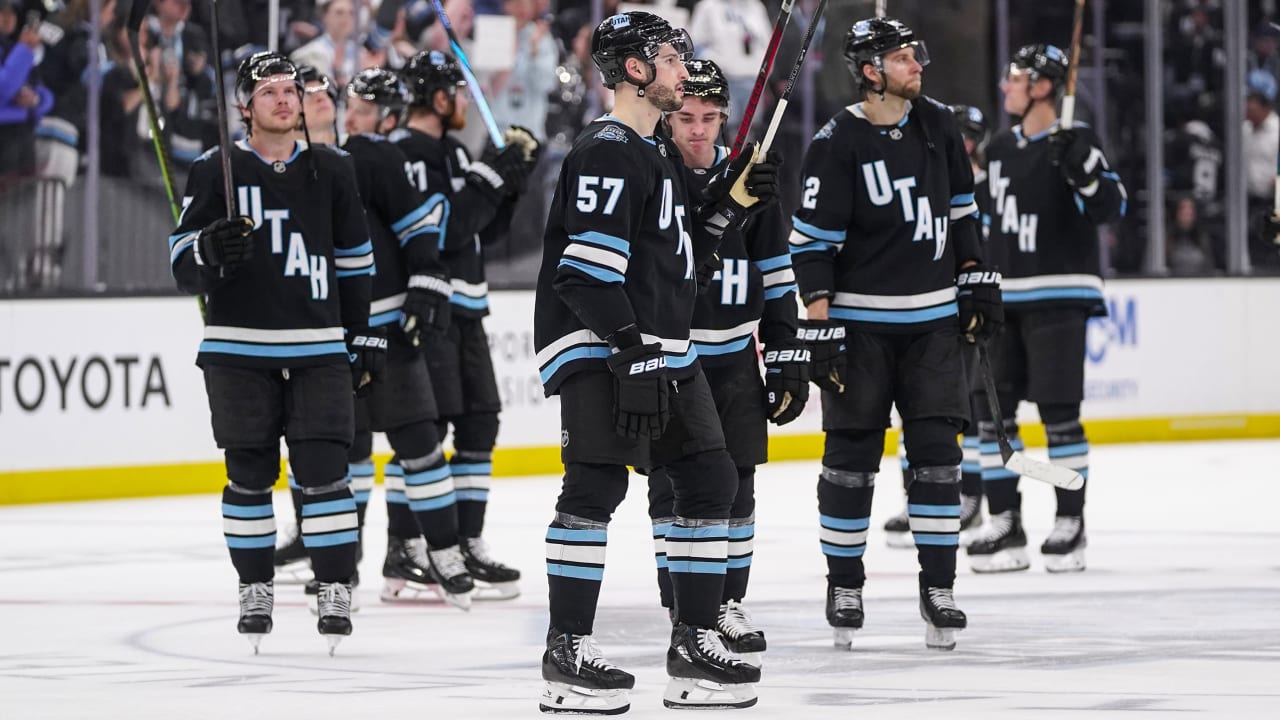
The fans rose to their feet at the end of the Utah Hockey Club’s final home game, a 4-3 shootout loss to the Nashville Predators at Delta Center on Thursday. As they cheered, the players rose their sticks in salute.
It’s incredible what Utah has accomplished in a year, and it should only get better from here with a permanent brand identity, a new practice facility, an upgraded arena and an up-and-coming team.
“Our thesis in this endeavor was certainly that we had a great potential hockey market in Utah,” Utah president of hockey operations Chris Armstrong said. “And we’ve been absolutely blown away, far exceeding our expectations.”
It was almost exactly one year ago when the Arizona Coyotes finished the 2023-24 season with a 5-2 win against the Edmonton Oilers at Mullett Arena on April 17, 2024. Arizona had 77 points in the standings. The arena had a capacity of 4,600.
With no arena solution on the horizon, the NHL established a new franchise in Utah the next day. Utah purchased Arizona’s hockey assets and scrambled to prepare in about six months. Among the many tasks: creating a temporary brand identity, building a temporary practice facility at Utah Olympic Oval and completing initial renovations of Delta Center, home of the NBA’s Utah Jazz.
Utah finished its inaugural season Tuesday. It had 89 points in the standings and sold out the 11,131 full-view seats for every game at Delta Center. It set arena records for beer and merchandise sales, and it secured so many corporate sponsorships that it’s on track to rank among the top 15 teams in the NHL in overall sponsorship revenue.
The team hosted 10 community events and attracted about 10,000 kids to hockey programs. Owner Ryan Smith said Smith Entertainment Group will donate up to $500,000 per rink for up to 20 new rinks built by entrepreneurs across the state.
“The response from the community has been incredible,” Armstrong said. “It’s been very energizing and motivating to all of us with everything that we’ve needed to do and accomplish to stand up this team and mobilize for our inaugural season. A lot of that fuel came from the passion and support that we’ve received in the community.”
Ninety percent of season-ticket holders will renew for next season. Work is already beginning on the next phase of Delta Center renovations, with details to be released soon.
“We’re not wasting any time there, getting right down to it, and obviously our goal on the hockey side is to continue to bring as many great seats online each summer as we can to ultimately make a world-class NHL venue,” Armstrong said.
The permanent practice facility at The Shops at South Town is scheduled to be ready for the team in time for training camp in September and for the public late in the year. Utah plans to announce the permanent brand identity sometime before next season, but the timing depends on the trademark process.
“There are obviously some tentpole moments throughout the summer that we’d love to take advantage of, but it’s a painstaking approach to get all of the [intellectual property] protected in the ways that we want so that we can unveil it to the world and celebrate it with our fans,” Armstrong said.
The future is bright on the ice. Among the highlights this season: Forward Clayton Keller, the first captain in Utah history, led the team and set an NHL career high with 90 points (30 goals, 60 assists) in 81 games. Forward Logan Cooley, who turns 21 on May 4, had 65 points (25 goals, 40 assists) in 75 games. Forward Dylan Guenther, who turned 22 on April 10, had 60 points (27 goals, 33 assists) in 70 games.
“From the very beginning, we set our expectations really for the young guys in our group to take a step forward in their development and for us to be playing meaningful games down the stretch, which we ended up doing right into the month of April,” Armstrong said. “We’ve had obviously some great standout performances.”
Utah has promising prospects on the way. It also has salary-cap space and extra picks in the NHL Draft, including three second-rounders in 2026, giving management the ability to make moves.
“It doesn’t necessarily mean we’re going to do anything,” Armstrong said. “What it means is we’re going to have the good fortune of being in all of those conversations and evaluating what’s best in the short term and long term for our organization, and that’s a great place to be.
“To have that flexibility, to have those resources to truly be able to evaluate everything, is something we won’t take for granted, and you’ve still got to make good decisions and get those decisions right. And that’s the primary focus. We know areas, of course, like every other team, that we think we can improve, and we’re going to look to do that.”
This post was originally published on this site be sure to check out more of their content.







